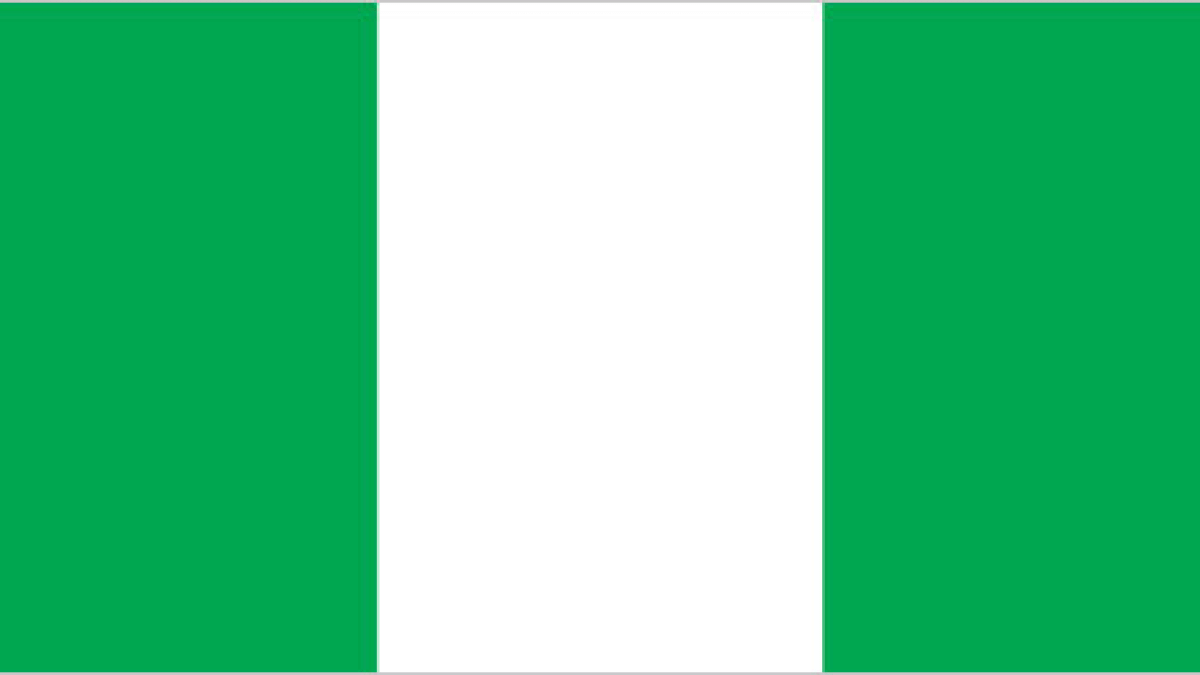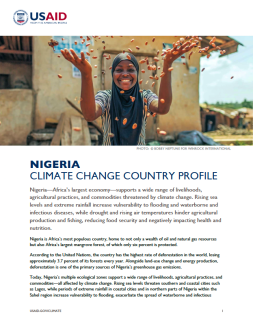Nigeria—Africa’s largest economy—supports a wide range of livelihoods, agricultural practices, and commodities threatened by climate change. Rising sea levels and extreme rainfall increase vulnerability to flooding and waterborne and infectious diseases, while drought and rising air temperatures hinder agricultural production and fishing, reducing food security and negatively impacting health and nutrition.
Nigeria is Africa’s most populous country, home to not only a wealth of oil and natural gas resources but also Africa’s largest mangrove forest, of which only six percent is protected.
According to the United Nations, the country has the highest rate of deforestation in the world, losing approximately 3.7 percent of its forests every year. Alongside land-use change and energy production, deforestation is one of the primary sources of Nigeria’s greenhouse gas emissions.
Today, Nigeria’s multiple ecological zones support a wide range of livelihoods, agricultural practices, and commodities—all affected by climate change. Rising sea levels threaten southern and coastal cities such as Lagos, while periods of extreme rainfall in coastal cities and in northern parts of Nigeria within the Sahel region increase vulnerability to flooding, exacerbate the spread of waterborne and infectious diseases, and contribute to erosion and infrastructure damage. At the same time, droughts, reduced rainfall in certain areas of the country, and rising air temperatures jeopardize Nigeria’s water security and hydropower systems and hinder agricultural production and fishing, which in turn reduces food security and negatively impacts health and nutrition.
Government of Nigeria Climate Priorities
The Government of Nigeria updated its Nationally Determined Contribution (NDC) in 2021 in support of the United Nations Framework Convention on Climate Change Paris Agreement, which establishes an unconditional contribution target for reducing greenhouse gas emissions by 20 percent below the business-as-usual emissions scenario by 2030, and a conditional target of 47 percent greenhouse gas emissions reduction below 2018 emissions levels, contingent on international support. The 2021 NDC update included emissions reductions from the waste sector for the first time, covered the water resources sector, and promoted other efforts to reduce emissions from agriculture, forestry, and land use.
The National Council on Climate Change—established in 2021 by the Nigeria Climate Change Act—mainstreams climate change actions that seek to lower the country’s greenhouse gas emissions. Meanwhile, Nigeria’s National Adaptation Plan Framework, adopted a year earlier in 2020, articulates the country’s climate adaptation objectives and principles, guiding resilience-building actions and facilitating the implementation of priority adaptation activities. Finally, the Nigeria Energy Transition Plan outlines Nigeria’s commitment to carbon neutrality by 2060 across five key sectors—power, cooking, oil and gas, transport, and industry.
USAID’s Climate Change Program: Objectives and Results
USAID supports the Government of Nigeria’s development and climate priorities through Power Africa, Feed the Future, and water, sanitation, and hygiene programming.
Renewable Energy
About 70 percent of Nigeria’s primary energy supply is derived from biomass resources. Poor on-grid power supply—which rarely exceeds 5 gigawatts—forces Africa’s largest economy to rely on more than 14 gigawatts of inefficient petrol and diesel backup generators, generating 30 percent of total fine particulate matter emissions from the entire continent. Nigeria aims to decrease the use of diesel generators for backup power by improving on-grid power generation and delivery from new gas, hydropower, and solar power projects while expanding access to solar home systems and mini-grids in rural areas.
USAID’s Power Africa initiative supports the Government of Nigeria’s efforts by unlocking stranded generation through improvements to on-grid transmission and distribution capacities; facilitating implementation of Nigeria’s Presidential Power Initiative to increase grid reliability; and supporting off-grid projects like the Solar Power Naija Program and the Nigeria Electrification Project, which seek to electrify millions through solar home systems and solar hybrid mini-grids. These efforts collectively support Nigeria’s Electricity “Vision 30:30:30” that aims to increase electric power generation from 5.5 gigawatts to 30 gigawatts, with 30 percent of that power sourced from renewable energy resources by 2030.
Key Results
USAID has helped:
- Support the installation of 2.6 million on-grid metered connections through the Power Africa initiative since 2018, while mobilizing more than $5 billion in public and private investments in the power sector and facilitating a 4,058 megawatt increase in the grid transformation capacity of the Nigerian transmission system, in collaboration with the Nigerian Ministry of Power, Nigerian Energy Regulatory Commission, and other public and private sector partners
- Since 2018, USAID/Power Africa also supported 2.4 million off-grid power connections in collaboration with the Rural Electrification Agency of Nigeria, the World Bank's Nigerian Electrification Program, and 189 private sector partners. In 2022, Nigeria became the largest off-grid electricity market in sub-Saharan Africa.
- Provide significant technical assistance through Power Africa that led the Government of Nigeria in 2023 to announce 42 winning bidders for its Gas Flare Commercialization Program, an innovative auction program meant to reduce the environmentally unfriendly practice of gas flaring; USAID estimates these sites flare between 2.6 to 3.1 billion cubic meters of gas per day—or 48 to 58 percent of Nigeria's total flared gas emissions as reported by the World Bank; capturing this gas and using it to replace other fuels for power generation, transportation, and other industrial purposes will reduce Nigeria’s carbon emissions by 5 to 6 million metric tons of CO2 per year
Key Renewable Energy Programs
Power Africa Nigeria Power Sector Program
Working along the entire electricity value chain, from gas supply to new generation, this program strengthens transmission and distribution networks and increases off-grid renewable energy deployment.
Adaptation
USAID supports the Government of Nigeria’s climate priorities by implementing resilience-building activities focusing on vulnerable communities in ecologically sensitive regions.
Key Results
USAID has helped:
- Empower approximately 1.6 million smallholder farmers who are implementing climate-smart agricultural practices through the use of improved seed varieties, such as drought-tolerant and early-maturing seed varieties
- Strengthen resilience to climate variability and change by ensuring that more than 354,000 hectares of farmland have adopted improved management practices or technologies
- Enhance the adaptive capacity of more than 61,000 people in Adamawa and Borno states through training on the bio-reclamation of degraded land, which involves an integrated system that increases both food production and farmers’ incomes while lessening the effects of deforestation and erosion by utilizing degraded lands for agriculture production
- Support more than 339,000 people with climate-resilient water infrastructure to adapt to the effects of climate change
- Train more than 1,520 farmers in Bauchi and Cross River states on improved tree crop management practices, with approximately 124,300 improved bush mango and cocoa seedlings distributed to enhance productivity and bolster climate resilience on existing farmland while curtailing encroachment on forests
Key Adaptation Programs
Rural Resilience Activity
This project promotes inclusive and sustainable agriculturally-led economic growth and strengthens the resilience of people and food production systems in northeast Nigeria.
Project for Improved Sustainability of Integrated WASH Services Activity
This project reduces waterborne diseases and associated socio-economic challenges through an integrated, participatory, and innovative approach that focuses on increasing climate-resilient, inclusive access to WASH services in health centers, schools, and unserved or underserved communities.
Natural Climate Solutions
Nigeria is the West African country with the greatest biophysical potential for climate mitigation from natural climate solutions, which include increasing tree coverage in agricultural lands, reforestation, and improving natural forest management. As stated in its 2021 NDC update, the Government of Nigeria aims to restore and protect 380,000 hectares of forest and mangrove by 2030, which would result in an approximately 20 percent reduction of Nigeria’s greenhouse gas emissions from agriculture, forestry, and other land uses. USAID contributes to achieving these targets through watershed protection efforts in Cross River and Bauchi states that maintain critical ecosystem services, including land-based greenhouse gas emissions reductions and carbon sequestration.
Key Results
USAID has helped:
- Preserve 600,000 hectares of tropical rainforest and savanna woodland, which are now under the protection of local communities
Key Natural Climate Solutions Programs
Watershed Protection for Safe and Sustainable Water Supply Activity
This activity, which generates both climate adaptation and mitigation benefits for the communities where it works, helps protect approximately 600,000 hectares of tropical rainforest and savanna woodland. The activity also minimizes greenhouse gas emissions from land use by strengthening capacities for protected area management, providing environmentally sustainable economic opportunities for local communities, and supporting enforcement of local laws and regulations related to illegal logging.
For More Information




